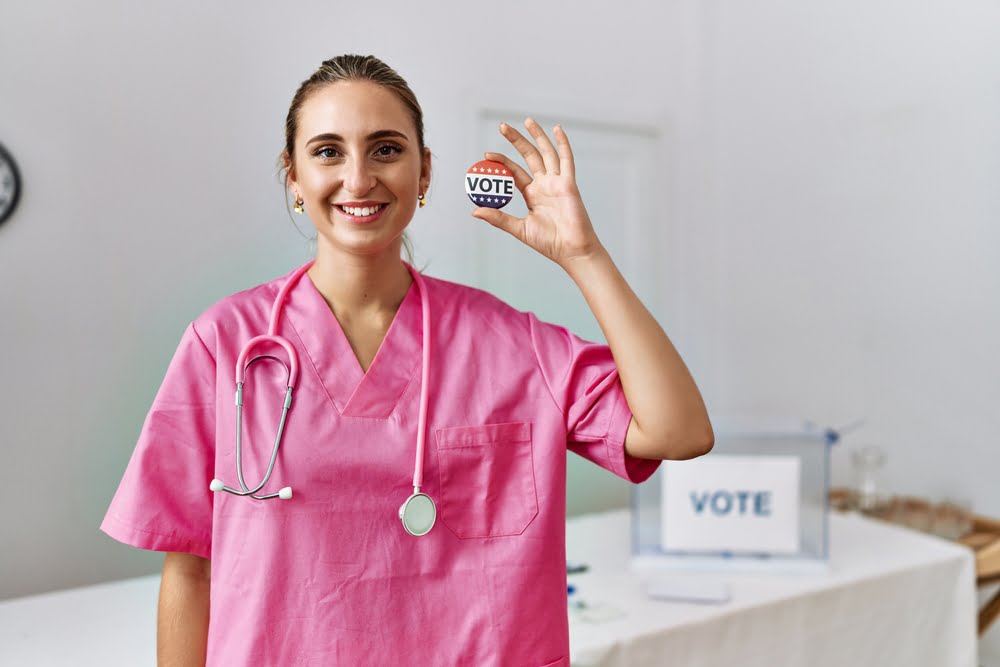Three days prior to Pennsylvania’s midterm election, the Philadelphia City Commissioners issued a news release containing information about “naked” vote-by-mail ballots. We need more callers to help cure ballots in Philadelphia.
Any ballot missing a signature, the date, containing a wrong date or missing the secrecy envelope is considered naked.
Dr. Zeke Tayler, a member of the group Physicians for Shapiro and Fetterman, refused to accept that thousands of Philadelphia ballots would be spoiled if they weren’t corrected. With little more than a cell phone and a Twitter account, Tayler launched an extraordinary effort to fix, or cure, naked ballots.
At breakneck speed, doctors, residents, interns and medical students were recruited to call Philadelphia voters from all parties and let them know that their ballot was naked and wouldn’t count unless they fixed the problem. ]
Please send me a DM if you can spare some time to make phone calls.
We are at 66.74%! pic.twitter.com/y0admFG7f9— Zeke Tayler (@zeketayler) November 8, 2022
“We started making phone calls and that morphed into medical students and residents making phone calls and that turned into having doctors downtown standing by to drive people from their house to the polls, to drive them to City Hall. There were so many people at City Hall that they actually shut it down early on Monday because the lines were so long,” Tayler said. Democracy in action! Med students from all over #philly dropping off ballots from hospitalized patients
By Tuesday morning – election day – Tayler realized the team wasn’t working fast enough so he posted an image on his Twitter account to show how much time was left. The phone calls started pouring in from across the state as well as one person from California and another from Washington state.
Jennifer MacKerchar, Inspector of Elections for District 13 in Warminster Township, was sidetracked and quarantined due to Covid but saw Tayler’s Twitter message and welcomed the opportunity to help with ballot curing.
“I messaged him and he shared the spreadsheet with me and then we did a quick call. He told me what to look for and then I just started phoning people,” MacKerchar explained.
In 70 hours, just shy of three days, Tayler coordinated dozens of volunteers who rose to the occasion, making 3,187 phone calls to cure ballots.
“We did it. No government assistance, no super PAC assistance. Someone messaged and said what organization is this going through and I said no organization. This is as grassroots as it gets,” Tayler said.
Simultaneously, Dr. Ben Abella, founder of Physicians for Shapiro and Fetterman, was also working to get out the vote.
“In the last 48 hours I was heavily involved in getting ballots to City Hall before the 8 P.M. deadline from hospitalized patients,” Abella recalled. “I worked with a large group of medical students – and they really deserve more of the credit, honestly – who were literally walking the halls and talking with patients to make sure they had voted.”
Amazing teamwork!#ElectionDay pic.twitter.com/kRa6PTZnF1
Abella and his team focused on Penn Medicine in-patients but said while at City Hall he had bumped into a group of Jefferson Health students who were doing the same thing.
“It was just an all-hands-on deck sort of thing,” he explained, “because we realized this was it, you know, now or never.”
Two Bucks County locals, Elizabeth Giuliano and Andrea Squiccimara, were also involved in the effort to assist voters and their efforts more than likely overlapped that of Physicians for Shapiro and Fetterman.
Giuliano was fielding questions by way of the Pennsylvania Voter’s Assistance Hotline that provides voters with answers about casting or curing a ballot regardless of party affiliation.
“I talked to several people on Monday and Tuesday who were left messages or received letters in their door telling them they were on the Philly lists for no date, wrong date, no signature, naked ballot,” Giuliano said. “I helped several of them figure out where to go to cure their ballot or to vote provisionally.”
Squiccimara was working with Turn PA Blue to alleviate her Tuesday “volunteer anxiety.” She said she was contacting voters about ballot deficiencies in Philadelphia and other counties throughout the state.
“I would say that I dialed 100 separate numbers. I think I spoke with five people but I left a lot of voicemails,” she added.
Physicians for Shapiro and Fetterman – with help from the Philadelphia medical community and many others from all walks of life – were able to cure more than 500 ballots and enable hundreds of voters to cast ballots.
Tayler remembers speaking with one woman who refused to cure her ballot and who remarked ‘if it’s meant to be, it’s meant to be’ just before hanging up on the doctor.
“And she called me back and she’s like ‘you know I just Googled who you were and I guess you’re real. Okay, have someone come get me’ and she’s this cute 83-year-old woman,” Tayler recalled. “There were so many stories like that. It just happened. It was very organic and it really showed me that people really do care,” he added.Both doctors intend to remain engaged in the political sphere and currently have their sights set on helping the Warnock campaign win the runoff in Georgia before gearing up for Pennsylvania’s municipal primary election in May.
Even with future plans on the horizon, neither doctor will soon forget their recent experience and what it was like to see democracy in action.
“It was amazing,” Abella said.
